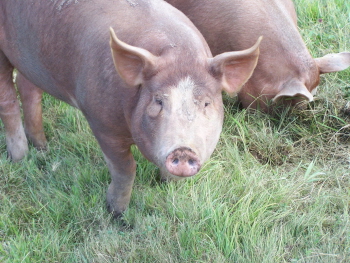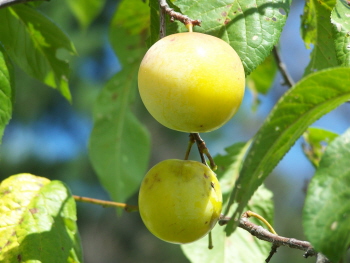Direct Sales
Hogs
Cindy and Jeff sell pork by the half or whole hog because selling individual cuts of meat (rather than half or whole animals) through retail or wholesale would require them to have the hogs slaughtered and processed at a USDA-inspected processing plant or a Minnesota Equal-To processing plant. (See "Meat Processing" Resource Tip box). The closest one of these to Clover Valley Farms is near Minneapolis-St. Paul, not a feasible distance for them.
As with poultry, Cindy and Jeff have found sufficient direct-sales demand that they are not motivated to pursue wholesale or other markets that would be less profitable at their scale. State regulations allow them to sell pork directly to consumers by the half or whole animal, as long as the entire animal is sold before slaughter. As a courtesy to their customers, they arrange for custom processing of the meat at a local custom-exempt processing plant.
They often refer their customers to an Iowa State University publication called the Beef and Pork Whole Animal Buying Guide (PDF, 8.66 Mb) for further information. Cindy and Jeff base their final price for the animal on the hanging carcass weight. Their customers pay them for the meat and pay the processor for processing costs.
Educator’s Perspective: Resource Tip As with poultry, understanding the distinction between a license and an inspection is an important part of complying with regulations for red meats such as pork, beef, and lamb. There are differences between the regulations for red meat and for poultry (see “Licensing, Inspections, and Registration for Poultry and Egg Producers” Resource Tip box). In Minnesota, farmers have several options for selling red meat. The option with the least regulatory oversight is sale of live animals and processing at custom-exempt processing plants. In this system, a farmer takes orders for whole animals or portions of whole animals. A typical scenario is sale of quarters of beef, or halves of hogs; but farmers can sell animals in other portions as long as they have the entire animal pre-sold before it is slaughtered and processed. Each customer’s portion must be identified at the custom-exempt facility. Farmers can arrange delivery of the animals to the custom-exempt facility. Customers should pick up their own finished meat from the facility, and should pay the farmer and the custom-exempt processor separately. The meat packages are marked with the customer’s name and are stamped “Not for Sale.” The customer may not re-sell any of the meat. It is for use only by the customer, the customer’s household, and non-paying guests. The farmer does not need either licensing or inspection in this system, because the farmer is not responsible for handling the meat. The farmer’s customer becomes the owner of the meat before the animal is slaughtered. Farmers who want to sell cuts or bundles of meat without pre-selling an entire animal must have their animals slaughtered under inspection and processed at either a USDA facility or a state Equal-To facility (See "Meat Processing" Resource Tip box). From that point of inspected slaughter and processing, the farmer has several options for marketing the meat:
Whether or not the farmer needs a license is a separate issue from whether or not a farmer needs an inspection. If the farmer will store meat in an on-farm freezer facility, or if the farmer will transport meat for sale in a mobile freezer or cooler, the farmer needs to have an inspection of that freezer facility or mobile unit. Food handler licenses are available for retail sales and for wholesale sales of meat. Which type of food handler license a farmer would need depends on the details of their business. Sales to grocery stores, restaurants, schools, or other food businesses would generally require a wholesale food handler license. Sales to individual customers would generally require a retail food handler license. A farmer’s meat sales business that includes both types of sales could be licensed under either a retail or wholesale food handler license, usually depending on what percentage of sales are retail vs. wholesale. Farmers with food handler licenses must renew their licenses annually, and are subject to inspection by the Minnesota Department of Agriculture’s Dairy and Food Inspection Division. Farmers who are selling only muscle meat with no off-farm ingredients added, and who therefore are not required to have a food handler license, may find it difficult to sell their products to food businesses. Food businesses may want to see a license before they purchase product from a farmer. It is the policy of the MDA to make food handler licenses available to farmers who want them for this type of marketing purpose, even if the farmer is not technically required to have it. Farmers who choose to get a food handler license are expected to comply with the usual inspection and renewal requirements associated with that license. Contact the MDA Dairy and Food Inspection Division for more information: 651-201-6027. Additional information is available at MISA’s Meat & Poultry Sales Web page, which includes links to MDA fact sheets. |
 |
 |


